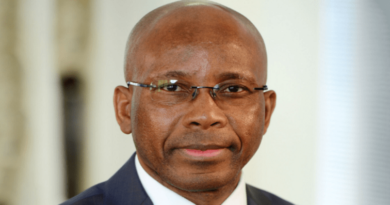These charts show how much trouble Eskom is in
South Africa’s government is putting the final touches on a R230 billion bailout package intended to get its debt-stricken state power utility back on track.
Read: Eskom’s gain is SA’s pain as investors balk at debt
Except it won’t be nearly enough.
Eskom, which supplies about 95% of the electricity used in Africa’s most industrialised economy, has more than R440 billion of debt — about R250 billion more than chairman Jabu Mabuza says it can afford to service. The government aid, which will be dispensed over several years, will mostly be swallowed up by ongoing losses.
Eskom lost at least R25 billion in the year through March and isn’t generating enough cash to service both its interest and debt repayments, even though it has secured rate increases of more than 500% since 2007, according to Anton Eberhard, a professor at the University of Cape Town who sits on a government task force advising on a rescue plan. The utility, which is due to release results next month, has endured years of mismanagement, massive cost overruns at new plants and a bloated wage bill.
In addition to the rising operating costs, Eskom needs to invest billions of dollars in new capacity to meet rising demand and replace obsolete plants — while simultaneously spending huge sums on reducing its environmental footprint.
Eskom is engaging with the government about the structure and timing of its proposed support, the utility said in an emailed response to questions.
These charts show the extent of Eskom’s problems:
Cost conundrum
Eskom expects its annual operating and maintenance costs to increase 17% over the next five years. The costs of fuelling its mainly coal-fired plants will probably surge about 50% over the period.
Tariff trouble

The National Electricity Regulator granted Eskom permission to raise tariffs by an average of 7.6% in each of the three years through March 2022, just over half of what the utility asked for. Power prices in South Africa have climbed by more than double the inflation rate over the past decade.
Superfluous workers

Eskom employs about 48 600 people, up from 32 600 a decade ago. The utility says it has about 16 000 more workers than it needs, while a World Bank study published in 2016 found it was potentially overstaffed by 66%. Job cuts are a thorny issue: They are opposed by the country’s power labor unions, which played a key role in helping President Cyril Ramaphosa win power.
Excessive emissions

The utility says it would take R300 billion to comply with emissions laws by 2025 at all of its coal-fired power plants — excluding six that it plans to decommission by 2030. But it has committed to spending just R63 billion. Eskom will utilise comparatively less expensive equipment to reduce its emissions of particulate matter and nitrogen oxides, and won’t install flue-gas desulfurisation units needed to reduce sulfur dioxide production, other than in two new plants that are under construction.
Read: Eskom’s turnaround imperiled as debt approaches R500bn
© 2019 Bloomberg L.P.
Source: moneyweb.co.za



